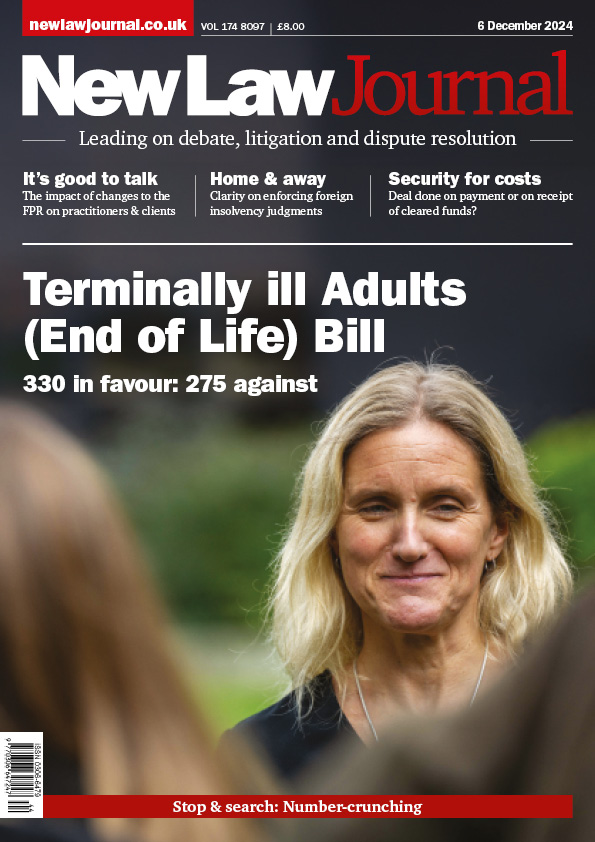THIS ISSUE

Foreign judgments can serve as the basis for bankruptcy or winding-up petitions even if not formally recognised in the courts of England and Wales, two recent judgments confirm. However, the process is not automatic, as Lauren Pardoe, partner, and Camilla Pratt, senior associate, in Rosling King’s dispute resolution group, write in this week’s NLJ.
The Family Procedure Rules (FPR) have changed. In this week’s NLJ, David Emmerson, partner at Anthony Gold, takes a detailed look at the new rulebook, particularly the powers granted by Pt 3 on case management and the use of non-court dispute resolution procedures.
The vital question of when exactly security is deemed received—whether it is on payment or on receipt of cleared funds—is addressed in this week’s NLJ, by Avneet Baryan, senior associate at Mills & Reeve.
The Terminally Ill Adults (End of Life) Bill, if passed into law in its current form, would ‘create the most tightly regulated regime, with the most safeguards, in the world where access to assisted dying is legal’, writes James Lister, partner at Stevens & Bolton, in this week’s NLJ.
How exactly are the police using their stop and search powers? In this week’s NLJ, Neil Parpworth of Leicester de Montfort University crunches the numbers and drills into the detail to uncover a less-than-rosy picture.
Bringing the assisted dying Bill into force will involve navigating a legal & ethical minefield, says James Lister
Neil Parpworth delves deep into the latest data to determine how the police are using stop & search powers
Changes to the FPR are resulting in more referrals to mediation. David Emmerson OBE explores the new provisions & their impact on practitioners & clients
The courts have provided welcome clarity on enforcing foreign judgments in English insolvency proceedings: Lauren Pardoe & Camilla Pratt outline the opportunities & challenges
Gustavo Moser sheds light on the nuances of negotiating & enforcing force majeure clauses
MOVERS & SHAKERS

Freeths—Ruth Clare
National real estate team bolstered by partner hire in Manchester

Farrer & Co—Claire Gordon
Partner appointed head of family team

mfg Solicitors—Neil Harrison
Firm strengthens agriculture and rural affairs team with partner return
NEWS
Conveyancing lawyers have enjoyed a rapid win after campaigning against UK Finance’s decision to charge for access to the Mortgage Lenders’ Handbook
The Crown Prosecution Service (CPS) has launched a recruitment drive for talented early career and more senior barristers and solicitors
Regulators differed in the clarity and consistency of their post-Mazur advice and guidance, according to an interim report by the Legal Services Board (LSB)
The dangers of uncritical artificial intelligence (AI) use in legal practice are no longer hypothetical. In this week's NLJ, Dr Charanjit Singh of Holborn Chambers examines cases where lawyers relied on ‘hallucinated’ citations — entirely fictitious authorities generated by AI tools
The Solicitors Act 1974 may still underpin legal regulation, but its age is increasingly showing. Writing in NLJ this week, Victoria Morrison-Hughes of the Association of Costs Lawyers argues that the Act is ‘out of step with modern consumer law’ and actively deters fairness







